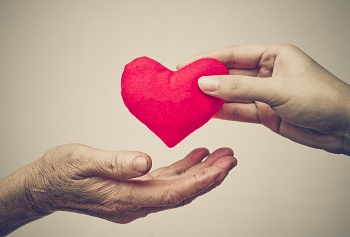Serotonin is a neurotransmitter that is known to be a contributor to feeling good about yourself. When an individual helps others, their serotonin level rises, which improves your mood and modulates cognition, learning, and memory.
Nervousness to severe anxiety attacks is extremely normal in our world. Yes, you can reduce anxiety by meditating, taking medication, or exercising. But believe it or not, volunteering is also a way to keep anxiety in check. Wouldn't it be nice to be in a happier state and raise children that are kind and generous beings? Maybe this generation can be called the "Caring Generation" instead of the Millennials, Generation, Generation Y, otherwise dubbed, ‘the Me generation’ who were born from 1980 -1994.

Helping others makes you feel good.
Suggestions to help make the art of giving a part of your family’s life: (Don't wait until your child is in high school and has to do volunteer work, start them young.)
1. Teach the importance of sharing. Encourage your child to share her toys or that last cookie.
2. Talk about how it feels when you share something with your husband or ask her how it made her feel after your child shares something.
3. Right after Christmas, I would have my children go through their toys and choose a few that they don't play with anymore, and then we'd donate them to the Salvation Army or Goodwill. If they’re too young, do it with them. Also, it’s a perfect time to go through their clothes. Again, discuss why you’re donating and how they feel when they give. (Instead of you packing it all in bags, let them do it. AND if they're old enough, let them carry it into the donation centers.)
4. Discuss with your children what charities you give to and explain why. (I never thought about doing this, and I donated a fair amount.) Tell your children how you feel when you donate, buy things for those in need, or help others.
5. While driving or during dinner, take time to discuss what you do to help others, even if it’s taking the time to listen to a neighbor share his bad day or help out at church or school. Mention how it made you feel when you were able to help. Make sure your children see you helping others.
6. Take the time to share personal stories of when you needed help and how others helped you. You’re sharing a part of your history which forms stronger ties between kids and parents.
By sharing your history, you not only serve as a role model, but you also let your children know you better. (Alan and I never thought about doing this either.) this builds even stronger family ties which will permit you to be a strong influence in their lives.
7. Once your children become old enough, as a family, spend an afternoon at a food bank or at a community clean-up project donating your time. This experience will be unforgettable as your children or grandchildren get to help out firsthand. (Vote as a family where to help out.) Don’t forget to praise their hard work and for giving up their time.
If your child loves animals and is old enough, encourage her to volunteer at an animal shelter.
I loved to help people, so I volunteered at a hospital for a few years as a Candy Striper when I was in junior high. This raised my self-esteem and helped me with my shyness.
8. If you’re giving an allowance to your children, decide what percentage should be given as tithe for your church or have them donate a certain portion to a worthy cause.
Young children may find the idea of giving a little confusing. If you suggest that your child donate $ 1.00 to the Salvation Army, explain that it will help feed and retrain the homeless. Then go to the pet store and buy a couple of dog food and cat food bags and drop it off together at a nearby animal shelter. This is real for your child because he can see the animals in need. (Beware. You might end up coming home with a pet.) Or maybe your child loves every animal she sees.
9. Remember, generosity can be displayed at home also. Say kind things to your family members. Take an afternoon and play a game with your children or do some crafts together. (We didn't do enough of this.) Or make them some favorite cookies or buy them a small toy they’ve been begging for. When you see your children being generous, point it out and praise them, even if they only showed the tiniest bit of kindness. Help them put into words the positive feelings they may have as they help others.
Make helping out, donating time, and discussing how one feels when you/they do it, a routine will help your children or grandchildren experience some trying times, they’ll hopefully remember the many times they did feel good about themselves, so alcohol and drugs will be the last thing they’ll try.


